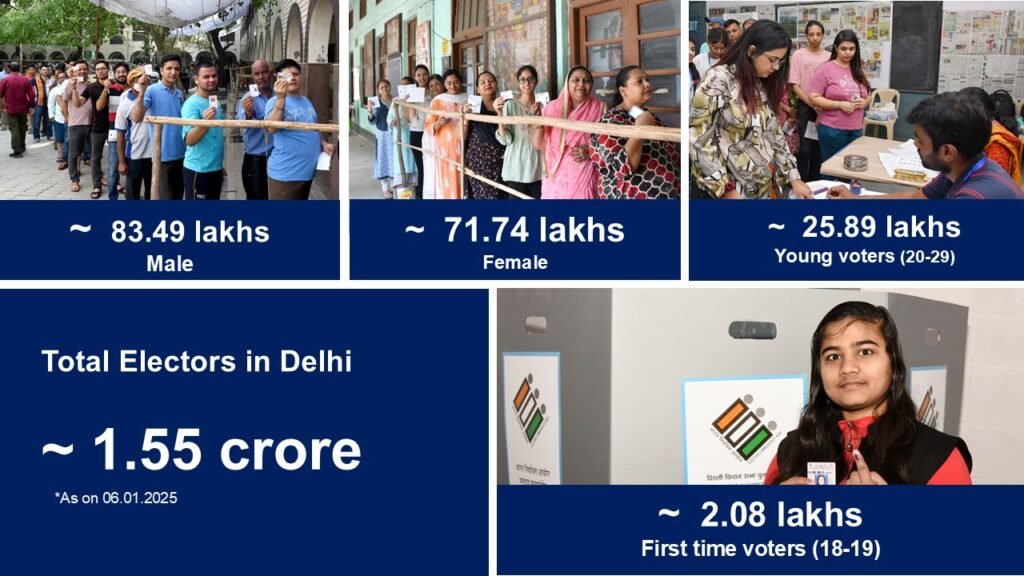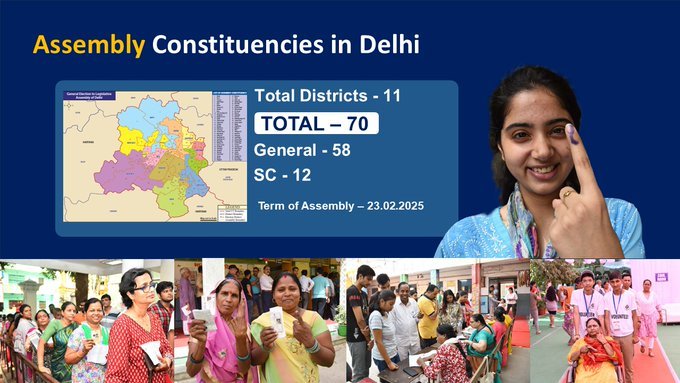Delhi Elections 2025: On January 7, 2025, the Election Commission announced the dates for the Delhi Assembly elections. Chief Election Commissioner Rajiv Kumar stated that voting will take place in a single phase across all Delhi seats on February 5. The results will be declared on February 8. This time, the main contest in the Delhi Assembly elections will be between the three major political parties: Aam Aadmi Party (AAP), Bharatiya Janata Party (BJP), and Congress. These parties have each claimed to outperform the others during their election campaigns. Several new issues have also emerged in this election, making Delhi politics more interesting.
Let us delve into the significant issues in the Delhi assembly elections, the parties in the fray, and how the electoral equations are shaping up.
Table of Contents
Delhi Elections 2025: AAP Faces a Challenge Despite Its Past Success
Aam Aadmi Party (AAP) has been in power in Delhi for the last 12 years, securing landslide victories in the 2013, 2015, and 2020 assembly elections. However, it now faces a major challenge in replicating its past success. One of the key reasons behind this challenge is the growing list of allegations against AAP.
In the first three elections, AAP came to power with an image of integrity. But ahead of this election, allegations related to the liquor scam and the renovation of the Chief Minister’s bungalow have surfaced, making it harder for Arvind Kejriwal to maintain his previous momentum.
Furthermore, both the Bharatiya Janata Party (BJP) and Congress have intensified their campaigns by including strong leaders in their candidate lists, signaling that they are leaving no stone unturned in this election.

Delhi Elections 2025: What will be the issues in this election?
1. Money laundering-liquor scam case
This time in the Delhi assembly elections, the biggest challenge will be the allegations of corruption against the Aam Aadmi Party. In the last three to four years, top leaders like Arvind Kejriwal, Manish Sisodia, Sanjay Singh and Satyendra Jain have had to go to jail. The biggest allegations among these have been related to money laundering and liquor scam cases, for which both BJP and Congress have been attacking AAP.
2. The Sheeshmahal issue
The renovation of Chief Minister Arvind Kejriwal’s residence (which is being called ‘Sheeshmahal’) has become a major election issue in the Delhi Assembly Elections 2025. In fact, the expenditure incurred by the Delhi government on the renovation of the Chief Minister’s residence has become a major reason for the opposition to attack.
Initially, the cost of this renovation was said to be Rs 7.91 crore, but in 2020 its budget was increased to Rs 8.62 crore. After this, when the renovation work was completed in the year 2022, its total cost reached Rs 33.66 crore. This report gave an opportunity to the opposition, and the BJP claimed that Rs 75 to 80 crore was spent on the Chief Minister’s residence.
The opposition alleges that while the people of Delhi were battling the Covid-19 pandemic and many people were losing their lives, the CM of the capital Arvind Kejriwal was spending heavily on the renovation of the Chief Minister’s bungalow. He did this work without any government permission and many irregularities also came to light in this. The BJP alleged that the material mentioned by the PWD department was not installed by the department, so the question arises as to where did this material come from and who is bearing the cost of it. On this issue, the opposition has accused the Kejriwal government of misusing public money, and it has become an important part of the election debate.
3. Cleaning of Yamuna
Cleaning of Yamuna river has become a major election issue in Delhi Assembly Elections 2025. The Aam Aadmi Party (AAP) had included cleaning of Yamuna in its priorities after coming to power in 2013, but even after 12 years, the pollution of the river remains the same. The party had also allocated huge funds for the cleaning work of Yamuna, but according to many media reports, no concrete results of these efforts are visible. Meanwhile, Delhi Lieutenant Governor VK Saxena and Delhi High Court have also criticized the government and advised to take strict action regarding negligence in cleaning work.
Opposition parties, especially BJP and Congress, have cornered the Aam Aadmi Party on this issue and said that the amount received by the Delhi government for cleaning the Yamuna was wrongly spent on publicity. They allege that the Sewage Treatment Plants (STPs) necessary to clean the dirty water in the Yamuna are not working properly, due to which the pollution of the river is increasing. Both BJP and Congress said that when they come to power, they will take concrete steps to clean the Yamuna and will solve this issue seriously.
4. Mahila Samman Rashi
In the Delhi Assembly Elections 2025, the issue of Mahila Samman Rashi has gained significant traction and become a major electoral strategy for political parties. Drawing inspiration from the economic schemes targeting women in the recent Jharkhand and Maharashtra assembly elections, which played a pivotal role in influencing election results, parties in Delhi are now focusing on women’s empowerment through financial assistance.
The Aam Aadmi Party (AAP) has introduced the Mahila Samman Yojana, promising Rs 1000 per month to women above 18 years of age. The party further assures that, if elected, this amount will be raised to Rs 2100. This scheme aims to boost the party’s popularity among women by directly addressing their economic empowerment. AAP has made it one of its key campaign promises, framing it as an essential initiative for improving women’s financial security.
However, the scheme has sparked controversy. The Delhi government has not formally announced such a scheme, and the Women and Child Development Department has issued a notice regarding it. Opposition parties, along with the Lieutenant Governor of Delhi, have called for an investigation into the matter, questioning its legitimacy.
In response, Congress has unveiled its own initiative, the Pyaari Didi Yojana, which promises Rs 2500 per month to women. With this offer, Congress is challenging AAP and seeking to draw women voters away from its rival.
This competition over Mahila Samman Rashi reflects its importance in the elections, as women’s economic empowerment directly impacts their quality of life and electoral choices. The stakes are high, making financial schemes for women a critical issue in the 2025 Delhi elections.
5. Water and water crisis:
Water crisis, pollution and water supply related problems have been a serious issue in Delhi for a long time. In the upcoming elections, emphasis is being laid on water supply and water recycling.

Delhi Elections 2025: Main parties and their alliances
Delhi Assembly Elections 2025 may see a tough competition between mainly three major parties – Aam Aadmi Party (AAP), Bharatiya Janata Party (BJP) and Congress. Apart from these, some other regional and smaller parties may also be in the fray.
Aam Aadmi Party (AAP): AAP, led by Chief Minister Arvind Kejriwal, has been in power in Delhi in the last several elections. The party’s main electoral focus is on providing better services, education, health and employment opportunities to the citizens of Delhi. AAP has always touted its good governance and management, and even now claims that Delhi has an honest and transparent governance.
Bharatiya Janata Party (BJP): BJP is all set to regain power in Delhi. This time the party can run a strong campaign against the Aam Aadmi Party, in which the emphasis can be on law and order in Delhi, promotion of central schemes and nationalism. The main agenda of BJP is the promise of better security, development and ‘Shaktshaali Delhi’ to the people of Delhi.
Congress: The Congress party has been relatively weak in Delhi elections for the last few years. However, this time the party can enter the electoral fray with new faces and strategies. If the Congress party succeeds in regaining its traditional vote bank, then it can gain an edge in some seats, but how effective its strategy will be will depend on the election equation.
Deciding factor: Vote bank and young voters
Young voters are always decisive in Delhi and this time too their number is quite large. This time there are a total of 1 crore 55 lakh 24 thousand 858 voters in the capital. According to the Election Commission, this time there will be more than 1.55 crore voters in Delhi elections. Among these, the number of male voters is 83,49,645. The number of female voters is 71,73,952. Whereas, the number of third gender is 1,261.
Know the history of assembly elections in Delhi
The state assembly in Delhi was first formed in 1952, when the system of interim assembly was implemented here. At that time, Brahma Prakash Yadav was sworn in as the Chief Minister of Delhi. Brahma Prakash Yadav’s tenure was from 1952 to 1955. After this, in 1955, Gurmukh Nihal Singh from the Congress Party was made the Chief Minister of Delhi. His tenure lasted till 1956.
A turning point in Delhi’s political history came when the Delhi Assembly was dissolved a year later on the basis of the recommendations of the States Reorganisation Commission. Subsequently, the Delhi Metropolitan Council was formed in 1966, a body created to handle the administrative affairs of Delhi.
But the permanent system of assembly in Delhi was established in 1993, when the Delhi Assembly was reorganized and elections were held for the first time. This step was taken keeping in mind the increasing urbanization and administrative complexities of Delhi, so that the people of the capital could get direct representation in their administrative matters.
The first elections were held in 1993
After the formation of Delhi Assembly, the first assembly elections were held in the year 1993. In this election, the Bharatiya Janata Party won with a huge majority and Madan Lal Khurana became the CM. With his becoming the CM, Delhi got a CM after a long gap of about 37 years since 1956.
However, despite the landslide victory of BJP at that time, 3 CMs were changed in the capital within 5 years. First Madan Lal Khurana had to leave the chair amid allegations of scam. After this Sahib Singh Verma got the command. However, the public also protested against him on the issue of inflation and he had to resign. After this Sushma Swaraj got the command. Who remained the CM of Delhi for less than two months.
Congress’ entry in 1998
In the 1998 Delhi Assembly elections, Congress made Sheila Dikshit its chief ministerial candidate, while BJP contested the elections with Sushma Swaraj as its face. Congress won this election and Sheila Dikshit took oath as the Chief Minister. After this, till 2013, Congress and Sheila Dikshit remained in power in Delhi.
2013 elections and the entry of AAP
In the 2013 assembly elections, the atmosphere was against Congress and Sheila Dikshit had to lose 15 years of power. In this election, BJP became the largest party, but was far from the majority. AAP won 28 seats and took the support of Congress and Arvind Kejriwal became the Chief Minister, although his government lasted only 49 days.
AAP’s historic victory in 2015
In the 2015 assembly elections, the Aam Aadmi Party created history by winning a record-breaking 67 seats. The BJP got only 3 seats and the Congress could not even open its account. After this, Arvind Kejriwal became the Chief Minister of Delhi for the second consecutive time.
2020 elections and AAP’s continued victory
In the 2020 elections too, AAP performed brilliantly and won 62 seats. BJP got 8 seats, while Congress once again shrunk to zero. After this, Arvind Kejriwal became the Chief Minister for the third time.
Arvind Kejriwal’s resignation and Atishi becoming
the Chief Minister
After the year 2023, Arvind Kejriwal resigned from the post of Chief Minister and Atishi took oath as the Chief Minister of Delhi.
Also read:

